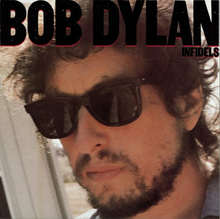
In “I and I” the ayes have it, any eye will do. I think Dylan plays with the meaning that sound summons to our mind when we hear it; the printed word “I” is just a mere symbol for the sound’s message to our ears:
I and I
In creation where one’s nature neither honors nor forgives
I and I
One says to the other, no man sees my face and lives
Forgiving and living lives throughout the song in rhyme with this chorus, and it’s where “I” and “I” lives, too, or you and me or even an eye for an eye. But one must have an eye for eye to hear the other rhyme sounds, more than eyes are needed to catch the union of sound rhyme creates. But really only hearing is needed–one must have any eye to hear rhymes, or an ear for seeing where they are, and in this song they appear in every other line, alternating rhymes that is, alternating like an I for an aye or for an eye:
“truth”/”tooth” is one of my favorites in the third stanza:
Took an untrodden path once, where the swift don’t win the race
It goes to the worthy, who can divide the word of truth
Took a stranger to teach me, to look into justice’s beautiful face
And to see an eye for an eye and a tooth for a tooth
Though I do have an eye for the second rhyme in the last verse:
Noontime, and I’m still pushin’ myself along the road, the darkest part
Into the narrow lanes, I can’t stumble or stay put
Someone else is speakin’ with my mouth, but I’m listening only to my heart
I’ve made shoes for everyone, even you, while I still go barefoot
Neither looks like they could rhyme, but they they do, according to my ears.
“I and I” live, London, 1993–thanks again for keeping a steady eye on this one for us woolhall, wherever you are; the electric guitar and harmonica are especially pleasing to the ear in this performance–worth playing through to the end:




